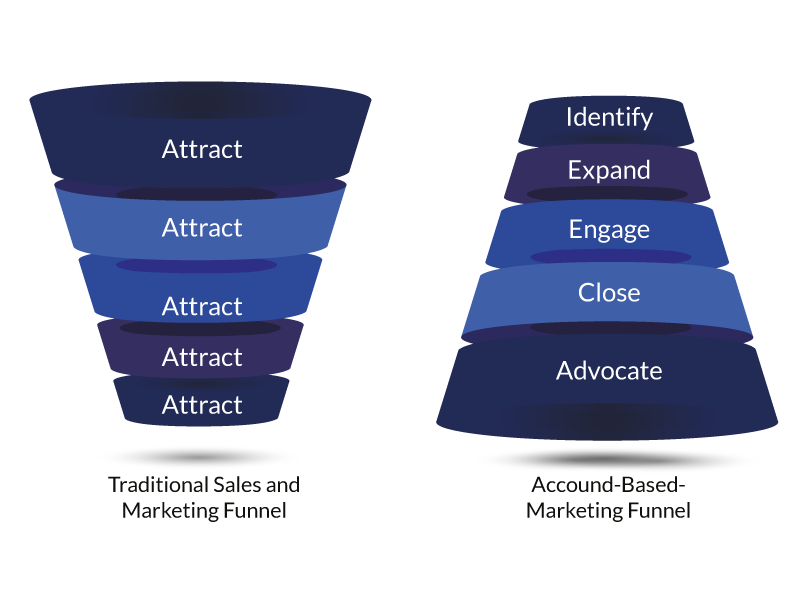Account-based marketing (ABM) is a marketing concept that is particularly popular in business-to-business marketing. With account-based marketing, B2B marketing gains whole new clout and adapts completely to customer behavior in the digital age.
Classic marketing concepts (e.g. advertising) were often designed to appeal to any number of people. It did not matter whether these people were already known to the company or not - a TV spot or a radio advertisement do not make a difference here. The classical communication was just "One-to-Many". Classic marketing (e.g. advertising or direct marketing) is also clear push or outbound marketing that does not ask whether the potential customer is interested in advertising communication.
In online marketing, too, most marketing instruments fail to establish an individual and targeted customer dialogue. Even online advertising, retargeting or social media can only rudimentary be targeted at individual target customers. All these marketing instruments are only suitable for B2B marketing to a limited extent. They are particularly unsuitable if only very specific customer companies that are on the wish list of marketing and sales are to be addressed. With account-based marketing, you solve this strategic marketing and sales problem.
Account-based marketing fully adapts to the needs of B2B marketing and especially to the fact that you want to address very specific companies without scattering loss.
What's more, account-based marketing allows you to differentiate between different people in potential customer companies and select them in such a way that only those people who make the decision to buy and influence the decision - the so-called buying center of the potential customer - are addressed. This buying center on the customer side can include different members of a B2B company such as the managing director, certain department heads, the purchasing department, or purchasing influencers such as personal assistants and secretaries.
Account-based marketing is designed to capture all these people, to provide them with content, and also to use the interactions between the members of the buying center to move the purchase decision in the desired direction. Account-based marketing uses marketing automation such as Marketo, HubSpot, Oracle Eloqua, Salesforce Pardot, SAP Marketing Cloud, or Act-On. Sometimes, it even makes sense to integrate specific account-based-marketing software add-on tools like Engagio, Terminus, or Bizible.
.png?width=800&name=TLS-Was-ist-Account-Based-Marketing-(ABM).png)
In account-based marketing (ABM), marketing and sales teams work closely together to reach the potential customers who best fit your offering (best-fit accounts) and turn them into customers. Account-based marketing takes a different approach than conventional B2B marketing. The traditional goal of marketing and sales in B2B business is to reach as many potential customers (leads) as possible and to move as many of them through the sales funnel to the purchase decision. The only problem with conventional lead generation is that the vast majority of B2B leads (over 99% according to Forrester Research) never become customers.
Account-based marketing turns classic B2B sales upside down with its sales process and sales funnel. Instead of starting with the choice of marketing channels (e.g. trade fairs, search engine advertising, or email campaigns), an ABM strategy begins with the identification and alignment of ideally suited potential customers in the market (best-fit accounts). Marketing collects all relevant information about these target accounts such as personal data, decision structures, and organization charts. On this basis, personalized messages can then be sent to the decision-makers in these companies - on all channels that are actively used by these target customers. This can be personal emails as well as content offers on websites, social media posts, or targeted retargeting advertising for the Internet addresses (IPs) of individual companies.
In classic B2B marketing and B2B sales, the focus is on sales funnel. First, marketing establishes contact with as many potentially suitable customers as possible (attract phase). As a rule, these customers are not known beforehand and it is not clear beforehand how many well-suited target customers (best-fit accounts) will be among the incoming leads.
Marketing builds up the contact (connect phase) to the leads gained and tries to advance lead qualification through content offers and nurturing processes and to increasingly activate customers (commitment). With some of the won leads the way goes up to the purchase conclusion (Closing) - many other leads remain in the Sales Funnel and do not develop further or disappear however completely from the view. Among the won customers however individual fans can be inspired further and motivated to further recommendations (Advocate).

About TLS
Contact
Newsletter